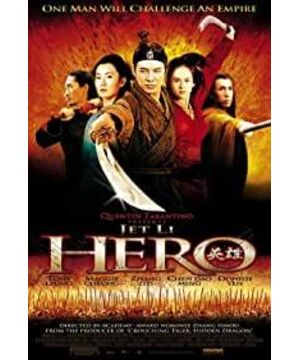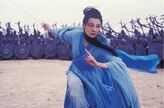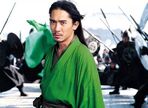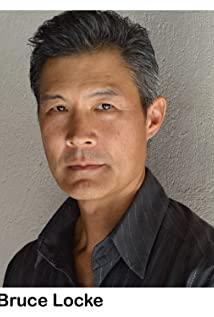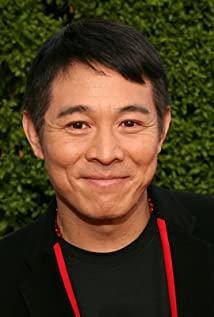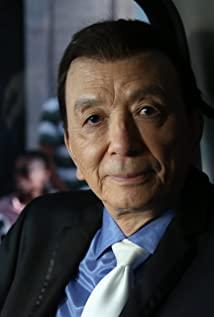Love to death, love not to die, love for the country, love for the world, and love for the people of Li and the people have made the nameless, the broken sword, and the extraordinaryness of the popular story "Hero". And this kind of great love is reflected in the use of color throughout the film.
Black is the main tone of the film throughout, starting with black and ending with black. At the beginning of the film, the black team, the black flags, the whole picture is heavy and solemn. The nameless swordsman is dressed in black and has a strong physique. The white-clothed waiter holding a sword by his side is squat. As the hero of Qin who defeated the three major assassins, Changkong, Canjian, and Feixue, it should be festive and happy. , but it is chilling and cold, black and white match, we don't know what it means. The gray stairs covered half of the screen, and on both sides were the black Qin Jun, who went up the stairs without a name. The black smeared in the mighty gray stairs appeared thin and small, with a slow and heavy pace, the cold and lonely figure was firm. Such as iron, the solemn and tragic atmosphere rushed toward the face, no one knew what turbulent waves were hidden behind this mighty black. In the empty and desolate hall, the First Emperor and Wuming Yaoyao looked at each other, even the warm colors across the candles were still like the two ends of the Milky Way, distant and lonely. In five paragraphs, three swords and two hearts collide, gradually approaching.
The first narration, Wuming vs. Changkong, the narration color is gray. Gray is a very interesting color. It is different from the deepness of black and the desolation of white. Compared with the clarity and determination of black and white, gray always seems to have an ambiguous taste. What exactly is in it. Wuming vs. Changkong, I personally think this scene is the most delicious and wonderful performance in the whole film. The gray color came from the moist air of the misty rain in Langmeng County, which is under the jurisdiction of Wuming. The rain falls into the gray chessboard along the gray pavilion, and the silent exchange of fire between black and white in the raindrops ding dong, seems to be the two sides with a clear distinction between the two sides, and it seems that the enemy and the enemy are indistinguishable against the gray background. The light gray gown of the old man who played the qin, the dark gray of the seven masters of the Qin Palace, the nameless pure black and the dark yellow of the sky, the opposing colors are clearly divided, and the battle unfolded in the mind of the piano, the black and white movie. Formally expressed, the two sides with clear distinctions have been united in a quiet gray like splashing ink. We do not know that in such a color, it seems to be a fierce confrontation and a confrontation that seems to be a flying ink and wash, the interlacing of reality and ideas, fierce battles. What are the hearts of both parties. And in a dull gray, black and yellow, no matter how bright the color is, there is a distinct and strong independence of the Soviet Union, nameless and sky, they have the same kind of forbearance light.
There is always a colorful story behind the forbearing person, and the light composed of the primary colors of red, green and blue is equally colorful. The last four paragraphs tell the same story, and the narrative colors are red, blue, green, and white. Red and blue, two colors with the same distinctive personality but completely opposite hues, red and blue describe the collision and confrontation of thoughts under the silent appearance of the two parties looking at each other on both sides of the candle. Red is the color of the broken sword and flying snow that Wuming brought to the King of Qin. It is a story composed of characters in red clothes fluttering, but it is full of jealous anger and agitation, personal entanglement of love and hatred, and the resulting killings. The bloody smell of life and death. In such a story, Canjian Feixue's love is so intense and extreme, yet narrow and desperate. Nameless, simple but deadly provocation, Feixue's determination to kill Can Jian, the blood-dropping Populus euphratica's grief, are strung together into a smooth and successful story of intelligent Qin warriors killing assassins, extremely warm colors, extremely sad tell. Contrary to the warm color of red, blue is an extremely cold color, and the opposite of the nameless story is the completely opposite story narrated in blue brought by the King of Qin. The warriors Changkong and Canjian Feixue, who cherished family hatred and hatred for the country, gave great trust to the same ambitions for ten years of forbearance and hard training just to assassinate Qin's Wuming, and exchanged their lives for Wuming's chance to assassinate Qin. In that battle to pay homage to the victims, the deceased rested in peace and in the heart of a peaceful lake, looked up from the light blue lake, and the nameless sword danced against a blue sky. In the minds of the swordsmen who sacrificed themselves in the world. The king of Qin said that the warrior Wuming, who defeated the three assassins, was the biggest assassin. The Lan in the story also seemed to be the calm and wise man of Qin who was not afraid of danger, and the feeling of admiration for those who sacrificed their lives for righteousness. The three swords allowed Wuming to approach the King of Qin within ten steps, and also allowed the King of Qin to walk into Wuming. Ten steps, a close enough distance, even if the candles flickered, it was enough for them to see each other clearly.
Later, Wuming's true retrospection of the facts restored the original appearance of the facts, and the protagonists confronted them with their truest faces. Without the rendering of subjective colors, the pure white narrative allows the protagonists to restore their own thoughts, full of personality and individuality, and the love and hatred of one person and one country is so widely promoted in the world. The orphan of Zhao Guo, who has been practicing swordsmanship for ten years, has outstanding swordsmanship, the courageous swordsman Zhangkong Feixue is willing to help himself, and Canjian is beyond his identity as an assassin. Canjian stopped Wuming from stabbing Qin, and let the original story turn around, which brought the audience the same great doubts as King Qin. With the paleness of reality against the background of Can Jian's memories, every bit of the past has become verdant. Green is the original color of life, like the budding heart and the greenness of love when Can Jian Feixue first met. Green is the tall and straight noble bamboo, like a broken sword, flying snow, turbid world, and hand in hand to reach the sky and the earth. Green is the best interpretation of nature, like Canjian Feixue's dream of retreating from the world and returning to the mountains and forests. However, green seems to be a color that does not belong to Qin. The green drapery in the Qin Palace, and the last not to kill the sword, seems to be out of place in the cold and chilling Qin in the background of the story. But when Canjian white clothes floated in the vast desert and wrote the word "world", everything seemed reasonable. The most extensive love of all life, the hope of realizing the end of the killing of the world.
This kind of reason is shocking and sighing. It is still a solemn darkness. King Qin suddenly understands. It turns out that Canjian is his confidant. Nothing is more important than meeting a confidant. The King of Qin realized the true meaning of Cangjian's calligraphy and swordsmanship. He turned around and sighed that this life is enough. The distance between Wuming and the King of Qin is ten steps, and the power of a ten-step kill is unmatched. The highest state of the sword, as the King of Qin said, is not to kill. Do not kill, Wuming did not assassinate the King of Qin in the end, for the sake of the world for the common people, not to kill, is the hope that the world will stop the killing, even if it is peaceful. The ending of the story is like the whiteness of the truth of the story, and in the end, it was dyed a desolate color, the remnant sword flying snow embraced to death and the desert Gobi, and the nameless and a black sword pierced through the heart. The hatred of the family and the country is ultimately insignificant in the face of the great love of Boji common people. Those who sacrifice their lives for righteousness use their lives and blood to achieve great love without bounds, and their love for common people will not be extinguished until death. Love does not die, many people will die, but the king of Qin is alive, and the dead use their lives to let the living remember the highest realm of the sword without killing and peace, and love continues. Black starts with black ends. After such a deep color goes through the gorgeous ups and downs of various colors, there are many other more profound connotations in the tragic and solemn. Love to death, love not to die, "Hero" uses color to write great love.
View more about Hero reviews


